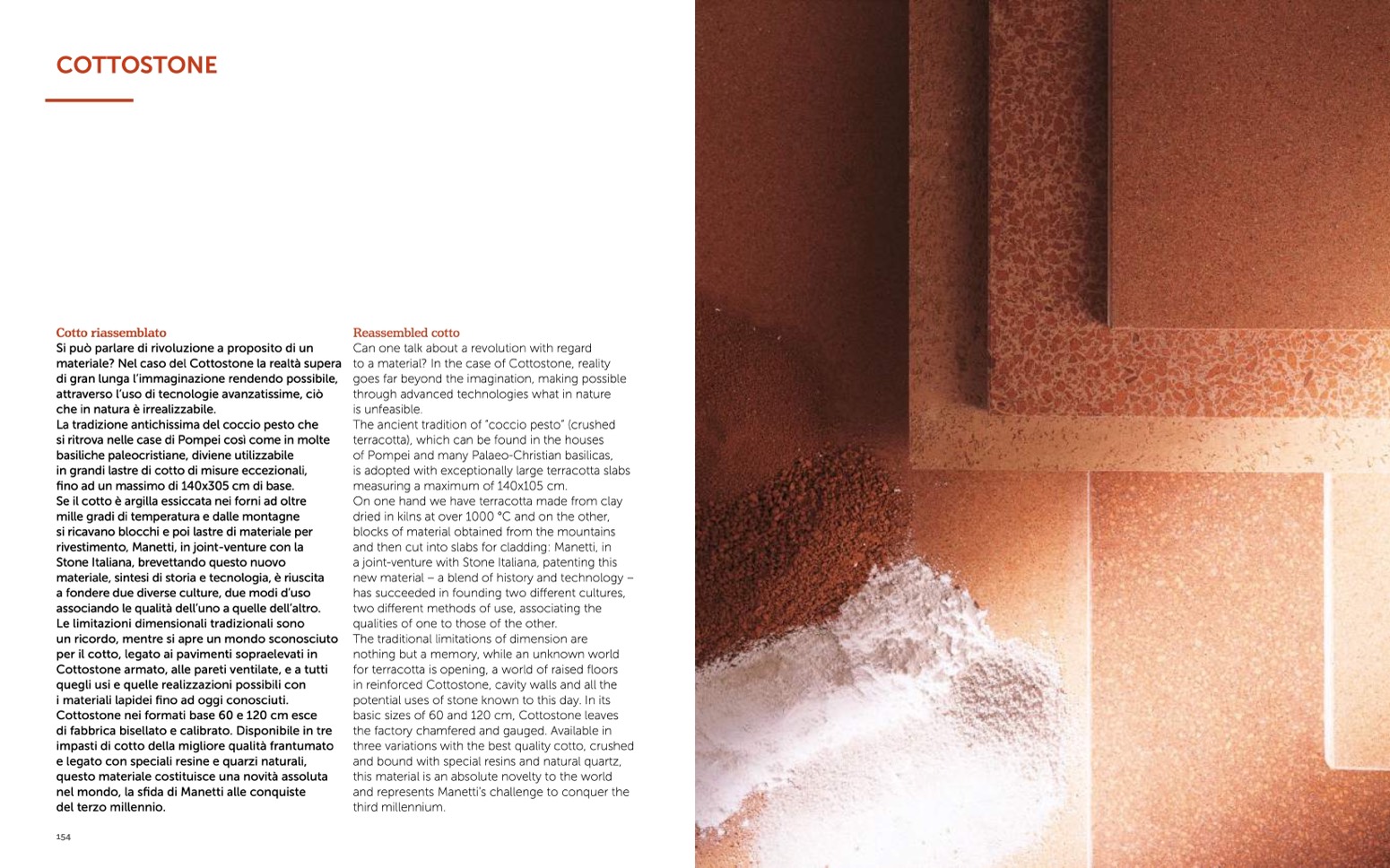
COTTOSTONE
Cotto riassemblato
Si può parlare di rivoluzione a proposito di un
materiale? Nel caso del Cottostone la realtà supera
di gran lunga l’immaginazione rendendo possibile,
attraverso l’uso di tecnologie avanzatissime, ciò
che in natura è irrealizzabile.
La tradizione antichissima del coccio pesto che
si ritrova nelle case di Pompei così come in molte
basiliche paleocristiane, diviene utilizzabile
in grandi lastre di cotto di misure eccezionali,
fino ad un massimo di 140x305 cm di base.
Se il cotto è argilla essiccata nei forni ad oltre
mille gradi di temperatura e dalle montagne
si ricavano blocchi e poi lastre di materiale per
rivestimento, Manetti, in joint-venture con la
Stone Italiana, brevettando questo nuovo
materiale, sintesi di storia e tecnologia, è riuscita
a fondere due diverse culture, due modi d’uso
associando le qualità dell’uno a quelle dell’altro.
Le limitazioni dimensionali tradizionali sono
un ricordo, mentre si apre un mondo sconosciuto
per il cotto, legato ai pavimenti sopraelevati in
Cottostone armato, alle pareti ventilate, e a tutti
quegli usi e quelle realizzazioni possibili con
i materiali lapidei fino ad oggi conosciuti.
Cottostone nei formati base 60 e 120 cm esce
di fabbrica bisellato e calibrato. Disponibile in tre
impasti di cotto della migliore qualità frantumato
e legato con speciali resine e quarzi naturali,
questo materiale costituisce una novità assoluta
nel mondo, la sfida di Manetti alle conquiste
del terzo millennio.
Reassembled cotto
Can one talk about a revolution with regard
to a material? In the case of Cottostone, reality
goes far beyond the imagination, making possible
through advanced technologies what in nature
is unfeasible.
The ancient tradition of “coccio pesto” (crushed
terracotta), which can be found in the houses
of Pompei and many Palaeo-Christian basilicas,
is adopted with exceptionally large terracotta slabs
measuring a maximum of 140x105 cm.
On one hand we have terracotta made from clay
dried in kilns at over 1000 °C and on the other,
blocks of material obtained from the mountains
and then cut into slabs for cladding: Manetti, in
a joint-venture with Stone Italiana, patenting this
new material – a blend of history and technology –
has succeeded in founding two different cultures,
two different methods of use, associating the
qualities of one to those of the other.
The traditional limitations of dimension are
nothing but a memory, while an unknown world
for terracotta is opening, a world of raised floors
in reinforced Cottostone, cavity walls and all the
potential uses of stone known to this day. In its
basic sizes of 60 and 120 cm, Cottostone leaves
the factory chamfered and gauged. Available in
three variations with the best quality cotto, crushed
and bound with special resins and natural quartz,
this material is an absolute novelty to the world
and represents Manetti’s challenge to conquer the
third millennium.
154
155

